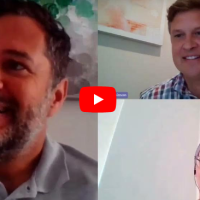By Sam Robinson
Working on things that won’t bear fruit for a while doesn’t happen by accident. “Busy-ness” is endemic in our culture: the need to feel like you’re constantly delivering stuff (and looking like you are, too). Slowing down – and you must slow down to think about the next few months and years – requires some discipline.
Say you have someone in your team who has been in your organisation for only 12 months. They have a lot of potential, delivering high quality work most of the time and coming up with some great ideas. On the other hand, they’re a bit off-hand with customers sometimes and are not always as punctual as you’d like. You’ve given this person feedback – about the good and the not so good – but the shortfalls keep happening. You know something needs to change.
There are a few common self-defeating myths about working on the future that I think hold us all back. Some of these you can pick up directly when someone is talking about their work. Others are more subtle and require you to look for the indirect evidence.
I don’t have enough time. This is a complex one. Some of us – I have definitely used this one – use this myth to keep us in the same spot. As humans, we can think the current environment is better than one we don’t yet fully grasp. Saying “I don’t have time” lets us put off change.
We don’t stick to the plan anyway, so what’s the point. Have you heard of Plan-Do-Check-Adjust? The planning part is conceptual. When you are planning, there are things you won’t foresee, and there are things you could have foreseen with a better planning process (we call the critical human interactions a “social process” – but that’s for another time). The upshot is: planning is a part of learning: how did we do, what did we do well, and what can we improve? We plan, then we reflect, and if we’re not learning…. well, you know the rest.
This will just give me a bunch of extra work! I’ll get to the point: initially, it will. Nothing much ever happens without doing work. Work is what keeps the wheels turning. However, planning clarifies the purpose of what you are doing: what you are ultimately aiming to achieve. Planning helps to remove unproductive work, freeing up time to focus on the meaningful stuff.
Let’s go back to our example. One path sees you sitting down with your team member for a fully-focused conversation on this person’s future, your perspective on their current ability, what they want to achieve, and how this fits with what you want to achieve. You help set out some clear short, medium and long term goals. You make sure this person understands that their own development is up to them, while you are there to create an environment to achieve their potential. After a few months of putting the plan in place, you look back and realise you don’t spend anywhere near as much time following up on their punctuality and worrying about their impact on customers. It’s now created another problem – but this time a good problem to have – which is that other team members want a development plan too!
To learn more about how we work with organisations like yours, visit us at lksquaero.com or follow us on LinkedIn, Facebook, and Twitter.










